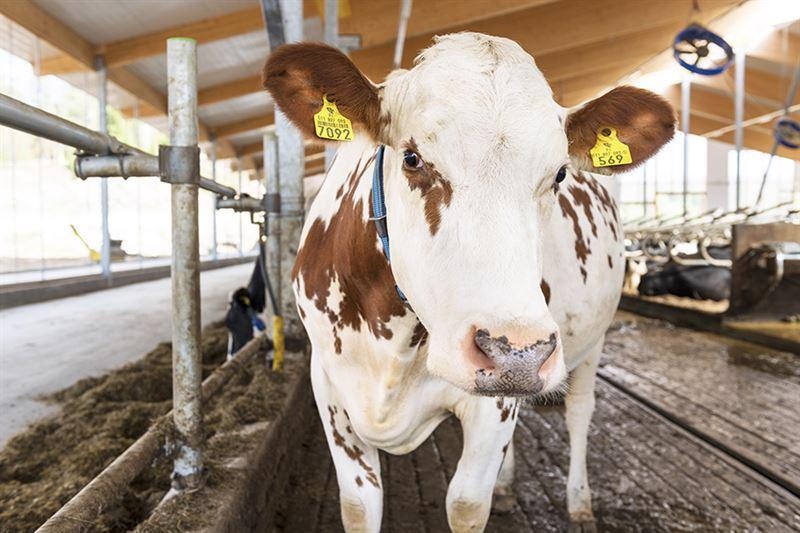Jun 16 2021
Food company Valio and energy company St1 are establishing a joint venture to produce renewable biogas from dairy farm manure and other agricultural by-products mainly as fuel for heavy-duty transport.

Image Credit: Valio
The company to be established is targeting up to 1,000 GWh (1 terawatt-hour) of biogas production by 2030; this amount is one third of the biogas needed for Finland’s fossil-free transport roadmap. Significant emissions reductions can be achieved by using biogas for heavy-duty transport. However, the prerequisite for creating a supply and demand that aligns with Finland’s biogas target is that the biogas-powered transport fleet becomes significantly more common in Finland.
The joint venture will produce biogas mainly from cow manure, although other agricultural and food industry by-products can also be used.
There are two different alternatives for producing the biogas: one alternative is that the biogas will be produced at individual farms or at a few farms in a shared biogas plant. The other alternative is that the biogas will be produced in a larger biogas plant to which the manure would be transported from local farms. Both the alternatives are possible in Valio and St1’s joint project. Valio and St1 have estimated that in phase one, around the middle of the decade, the biogas would be produced at 2-3 concentrations.
The partners are aiming for production capacity of up to one terawatt-hour by 2030, assuming there is enough growth in the demand for biogas in transportation. This is a significant investment package, the detailed planning of which will begin now.
St1 will distribute the joint venture’s biogas mainly through its nationwide network of fuelling stations for heavy-duty vehicles. Valio and St1 intend to transition to the increased use of manure biogas also in their own logistics.
“We have identified strategic focus areas, where we can best achieve our goal in creating a sustainable carbon cycle. By investing in renewable energy and in the transition of the energy sector while ensuring the necessary cash flow, we are solving global energy challenges. Entering the biogas business is a concrete step in the consistent and long-term implementation of our growth strategy. Domestic manure biogas can reduce the emissions from heavy-duty transport quickly and efficiently while simultaneously improving Finland’s fuel self sufficiency. This is an opening from two Finnish players in bringing domestic manure biogas to the markets,” says St1 Oy’s CEO Mika Wiljanen.
St1 communicated earlier this spring about the start of biogas business also in Sweden and Norway.
Agricultural emissions will also decrease
Making biogas from manure decreases the methane emissions from the biological decomposition of manure. At best, milk’s carbon footprint will decrease by one quarter, when both agricultural and transport emissions reductions are taken into account.
“Valio aims to cut milk’s carbon footprint to zero by 2035. The use of manure as a transport fuel is one of the most important handprint actions in our climate programme. The intention is that dairy farms can take part in the biogas production with a low threshold. It’s clear that production must be a profitable business also from the dairy farms’ perspective,” says Valio’s CEO Annikka Hurme.
Added bonus: recycled fertilisers, bedding for animals, and substrates for vegetables
The material left over from biogas production can be used to make many valuable circular economy products.
“Liquids and dry materials left over from biogas production can be used as recycled fertilisers for fields, reducing the use of chemical fertilisers and nutrient run-off to waterways. The farmer saves money. The left over material can also be used to make bedding for animals or substrates for vegetables. This can replace the peat that is currently used,” says Juha Nousiainen, Senior Vice President, Carbon-neutral Milk Chain.
Background info for media
- A total of ~15 million tonnes of manure is generated annually in Finland. It could be used to produce as much as 3–5 terawatts of biogas (VTT’s and LUKE’s estimated potential of Finland’s total manure).
- 4,300 Finnish dairy farms own Valio. These farms generate about 30 percent of the manure and other outputs suitable for biogas production.
- Traditionally, manure is stored at the farm in a slurry tank and transported to fields as fertiliser. The adverse smell of manure decreases in the biogas process.
- About one third of the energy contained in the grass feed eaten by cows ends up in manure.
- Manure also contains important nutrients needed by plants: nitrogen, calium, and phosphorus. The manure material left over from biogas production can be separated to dry and liquid fractions and used as fertiliser.
- The nutrient-rich liquid is used to fertilise fields. Plants are better able to absorb especially the nitrogen, compared to the traditional spreading of manure.
- Dry fractions can be used as phosphate fertiliser.
- The left over dry materials can also be used to make bedding for animals or substrates for vegetables. This can replace the peat that is currently used.